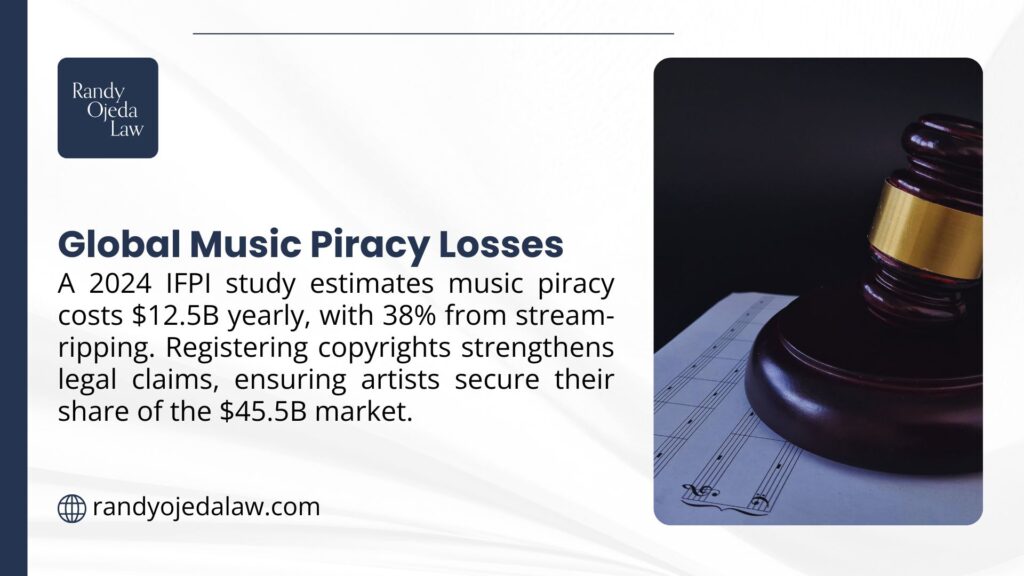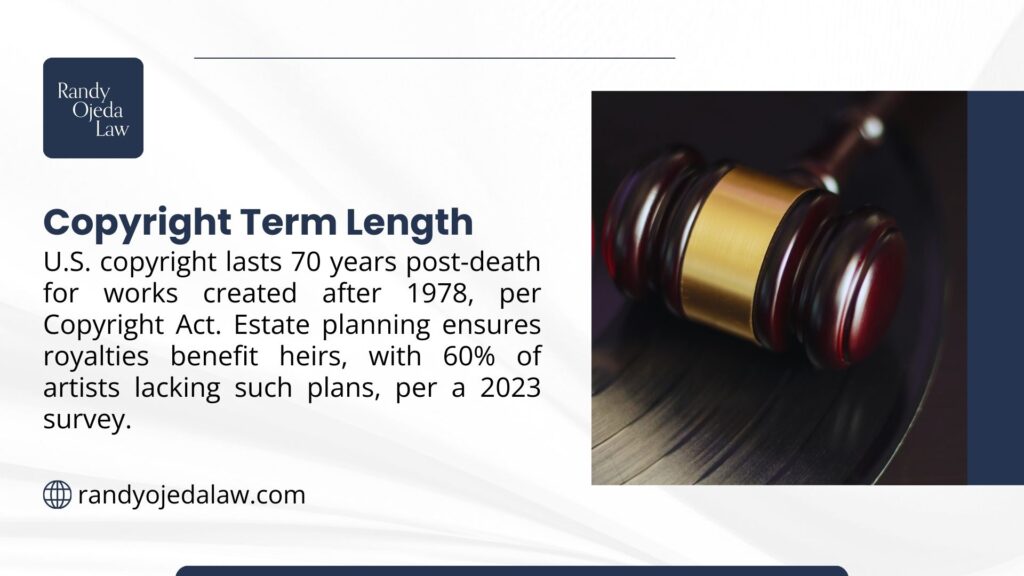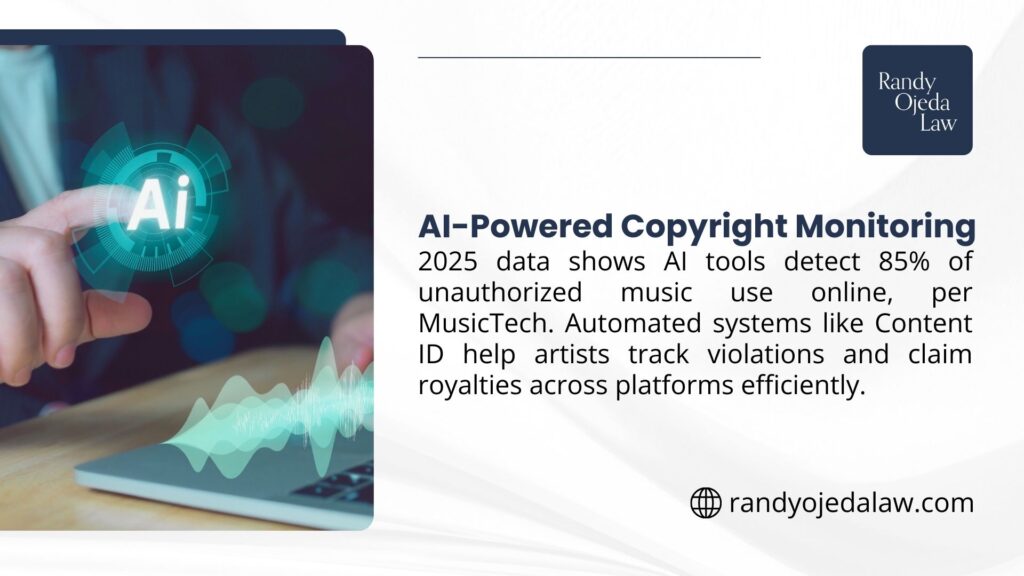The global music copyright market hit $45.5 billion in 2025, beating out movie box office sales for the first time ever. However, tons of musicians still don’t get how to copyright your music the right way.
It’s wild when you think about it. Spotify paid out more than $9 billion to artists last year alone. That’s serious cash flowing to people who figured out the copyright game. Meanwhile, about 1 in 5 musicians say they’ve never gotten royalties they think they deserve. Usually, it comes down to messy paperwork or not understanding the system.
The numbers keep climbing too. Industry experts predict the market will reach $9.1 billion by 2032.
What Musicians Need to Know About Copyright
Most artists don’t realize this, but copyright kicks in the second you create something. Write lyrics on a napkin? That’s copyrighted. Record a voice memo of a melody? Also copyrighted. No forms to fill out, no government office to visit. Just make something original and put it somewhere permanent.
The catch is that automatic copyright is pretty basic. Think of it like having liability insurance on your car versus full coverage. Both protect you, but one does a way better job when things go wrong.
Every recorded song actually gets two copyrights:
- First, there’s the song itself – the words, the tune, how it all fits together. Songwriters own this part.
- Then there’s the actual recording – that specific version you hear on Spotify or buy on vinyl. Recording artists and labels usually control this piece.
This split matters big time for making money. Different revenue streams go to different copyright owners. Radio play royalties might flow to songwriters through organizations like ASCAP or BMI. Streaming money often goes to whoever owns the master recording. Get this wrong and you’re leaving cash on the table.
Basic Protection vs Getting Registered
Every musician starts with basic copyright protection, but the smart ones don’t stop there.
Here’s what changes:
| Basic Copyright | Official Registration |
| You own it, but proving it is tough | Government records back you up |
| Hard to sue copycats | Can take infringers to federal court |
| Maybe get actual damages | Up to $150,000 per violation |
| Pay your own lawyer | The winner might get legal fees covered |
Registration puts your ownership in the government’s files and opens up federal courts when someone steals your work. Without it, going after copyright thieves gets expensive fast, and your legal options suck.

Getting Your Music Copyrighted
Step 1: Make Sure Everything’s Documented
Copyright law requires your music to exist in what lawyers call a “fixed form.” Basically, it needs to be written down or recorded somehow. A song in your head doesn’t count – it has to exist where other people can see or hear it.
The Copyright Office accepts pretty much anything. Digital recordings, sheet music, even basic chord charts with lyrics scribbled on them. Singer-songwriters can copyright just lyrics without any music attached.
Step 2: Pick Your Registration Type
The government offers a few different ways to register depending on your situation. Most musicians go with the standard application, but there are money-saving options if you’ve got multiple songs ready.
- Standard Application covers one song or recording where you did all the work and own everything.
- Group Registration for Unpublished Stuff lets you register up to 10 unpublished songs in one shot if you wrote them all.
- Album Registration handles up to 20 songs or recordings if they’re all on the same album and you had a hand in creating each one.
- Group options cost less per song but come with rules about who wrote what and whether the songs are published yet.
Step 3: Fill Out the Online Form
The Copyright Office runs everything through its website at copyright.gov now. The form walks you through all the details they need about your song, when you wrote it, and who owns what.
You’ll need to provide your contact info, the song title, creation date, and details about who contributed what to the final product. The system also asks about work-for-hire situations and whether you’ve registered this song before.
Don’t rush through this part. Mistakes here can slow down processing or cause headaches later if someone challenges your copyright.
Step 4: Pay Up
Filing fees depend on how you submit and what type of application you choose. Online costs way less than mailing paper forms, so most people go digital.
What it costs right now:
- Standard Online Application: $65
- Paper Application: $125
- Group Registration (Unpublished): $85
- Album Registration: $65
The Copyright Office changes these fees occasionally, so double-check the current rates before hitting submit.
Step 5: Upload Your Files
The government needs copies of whatever you’re registering. For digital stuff, they want specific file types – usually high-quality audio for recordings and PDFs for written music.
Albums need extras like artwork, liner notes, and complete song lists. The website spells out exactly what file formats work and what quality standards they require.
Step 6: Wait and Track
After you submit everything, the Copyright Office gives you a way to check on your application’s progress. Processing usually takes several months for regular applications, though you can pay extra for faster service if you’re in a hurry.
The tracking system shows where your application stands in their review process, so you’re not left wondering what’s happening.
Why You Need to Register
Legal Muscle
Registered copyright gives you way more legal power than the basic automatic stuff. Federal law says you have to register before you can sue anyone for copyright infringement on U.S. works. No registration means no lawsuit, which means no way to stop people from ripping off your music.
Registration also creates what lawyers call “prima facie” evidence. A term that means courts assume you’re telling the truth about creating the work first. Anyone who wants to challenge you has to prove you didn’t write it, instead of you having to prove you did.
Other legal perks:
- Federal courts will hear your case
- Statutory damages from $750 to $150,000 per violation
- You might get your lawyer’s fees paid if you win
- Official government record of ownership

Money Protection
Copyright registration protects your access to the various ways musicians make money. The music business has tons of different revenue streams, and registered copyrights put you in a stronger position to negotiate these deals.
Mechanical royalties come from people making copies of your music – CDs, downloads, streams. The Copyright Royalty Board sets these rates.
Performance royalties happen when your music plays on the radio, TV, streaming services, or at live venues. These flow through organizations like ASCAP, BMI, and SESAC to copyright holders.
Sync licensing pays when your music appears in movies, TV shows, commercials, or video games. These deals can be huge one-time payments plus ongoing royalties.
Getting help from experienced music lawyers makes sure you understand these revenue streams and structure contracts that work long-term.
Industry Credibility
Having registered copyrights shows the music industry you’re serious about your career. Record labels, publishers, and licensing companies see registration as proof that you understand the business side of music and protect your work properly.
This credibility becomes important when you’re trying to get deals or partnerships. Registered copyrights demonstrate that you’re not just talented, but also professional and business-savvy.
Common Copyright Myths
The “Mail It to Yourself” Scam
Plenty of musicians still think mailing themselves a sealed copy of their song creates legal copyright protection. This old trick, sometimes called “poor man’s copyright,” is completely useless under current law.
Copyright law doesn’t recognize self-mailing as valid protection at all. Sure, it might show when you created something, but it won’t help in court and definitely can’t replace proper registration when legal trouble starts.
Song Title Confusion
Most song titles can’t get copyright protection because they’re too short and not creative enough. Tons of songs share the same titles without any legal problems.
Super creative or really long titles might get protection in rare cases, but don’t count on it. The title “Love Song” appears on hundreds of different tracks without anyone getting sued.
Basic Music Elements
Standard chord progressions, common drum patterns, and basic melodies usually can’t be copyrighted individually.
Copyright protects how you combine and arrange these basic elements, not the individual pieces themselves. Otherwise, the first person to use a C-G-Am-F progression would own half the songs ever written.
Protecting Your Rights Aside from the Paperwork
Getting Professional Help
Music contracts are loaded with copyright traps that can steal your rights without you realizing it. Music contract lawyers know how to spot these problems and negotiate better terms.
Too many artists sign deals that look good on the surface but quietly transfer valuable copyright ownership or set up terrible revenue splits. Professional legal help prevents these expensive mistakes.
Contract Review and Negotiation
Any music industry contract deserves a thorough legal review before signing. Record deals, publishing agreements, and licensing contracts all contain provisions that affect copyright ownership and how much money you make.
Key contract issues:
- Whether you keep copyright ownership or transfer it
- How revenue gets split and when you get paid
- If and when you get your rights back
- Geographic limits on where the deal applies
- What the other party can and can’t do with your music
Smart contract negotiation can improve these terms significantly while keeping your copyright protections intact.
International Copyright Issues
U.S. copyright registration protects you domestically, but international treaties extend your rights worldwide through reciprocal agreements. The Berne Convention and similar treaties mean your U.S. copyright gets recognized in most countries without extra paperwork.
However, enforcement procedures and available remedies vary wildly between countries. What works in U.S. courts might not fly in European or Asian legal systems, so international careers require understanding these differences.

Modern Copyright Challenges
Digital Platform Chaos
Streaming services revolutionized how people hear music, but created a nightmare of copyright complexity. Different platforms need different licenses, and royalty calculations use formulas that would make a math professor cry.
Platforms have to secure mechanical rights, performance rights, and sometimes sync rights just to play your song. This creates opportunities for copyright holders but also makes the administrative side incredibly complicated.
Technology and Rights Tracking
Modern copyright management relies heavily on technology to track usage and collect royalties. Digital fingerprinting identifies copyrighted material across platforms, while automated systems distribute money to rights holders.
Blockchain and smart contracts are emerging as potential solutions for transparent, automated royalty distribution. About 30% of new indie labels have started using these technologies for better tracking and faster payments.
Social Media Copyright Problems
Social platforms and user-generated content create new headaches for musicians. You want fans sharing your music and creating content with it, but you also need to protect your rights and get paid.
Each platform handles copyright differently. Some offer revenue-sharing when people use your music. Others rely on takedown notices to handle copyright violations. YouTube’s Content ID system tries to do both, but creates its own set of problems.
Get Professional Copyright Protection for Your Music
Randy Ojeda Law handles music industry legal services, including copyright registration, contract review and negotiation, licensing agreements, and intellectual property protection. The firm works with everyone from new artists filing their first copyrights to established musicians managing complex rights portfolios.
Music contracts contain traps that can transfer valuable rights or create unfavorable revenue arrangements without proper legal review. Professional guidance ensures contracts protect long-term interests while maximizing current opportunities.
